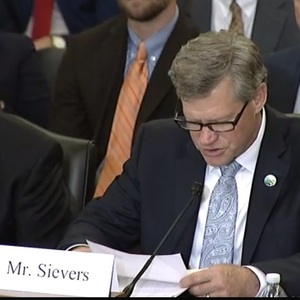Sievers testifies at Senate hearing on Farm Bill implementation




November 11, 2019
BY Erin Krueger
American Biogas Council Director Bryan Sievers testified at a hearing held by the U.S. Senate Committee on Agricutlure, Nutrition and Forestry on Nov. 7 focused on implementation of the 2018 Farm Bill’s rural development and energy programs.
Sievers, operates a family farm near Stockton, Iowa, that operates two complete-mix anaerobic digesters that produced biogas used to produce renewable electricity that is sold Alliant Energy. Reclaimed heat produced at the facility is used to heat the digesters and other buildings on the farm. He testified on the important of the farm bill’s rural development and energy programs and the role USDA can play in support of the Renewable Fuel Standard.
In his testimony, Sievers discussed the importance of the 2018 Farm Bill programs, including the Carbon Utilization and Biogas Education Program, and stressed the importance of providing sufficient funding to energy title programs. The 2018 farm bill energy title programs mandatory funding level ($375 million) is approximately 46 percent less than the mandatory funding provided in the 2014 farm bill ($694 million),” he said in his prepared testimony. “Alternatively, the total discretionary authorization provided by the 2018 farm bill ($1.7 billion) is approximately 13 percent more than what was authorized in the 2014 farm bill ($1.5 billion) for the energy programs. While the latter increase sounds positive, most energy title programs did not receive discretionary appropriations under previous appropriation bills, something that should change.” To ensure the U.S. bioeconomy continues to expand, Sievers called on Congress to increase annual discretionary funding for farm bill energy title programs.
Advertisement
Advertisement
Sievers also told the committee the USDA’s BioPreferred Program could be better utilized to create an initial market for the range of products produced by biogas systems, including fiber, nutrient products and digestate.
Regarding the RFS, Sievers said the U.S. EPA’s continued abuse of the small refinery exemption (SRE) program has undermined the integrity of the RFS. He urged the EPA to limit the use of these waivers to only their intended purpose.
Advertisement
Advertisement
He also stressed the need for the EPA to process applications that would allow renewable electricity to participate in the RFS. “One of the main goals of the RFS is to incentivize the development and deployment of new American produced biofuels, which will create energy independence and new markets for producers including the electricity produced from biomass,” he said.
While numerous applications for biogas-based electricity have been submitted to EPA under the RFS program, the EPA has yet to process or approve any of those applications, Sievers said. “The EPA has yet to set up the processes necessary for producers to generate renewable identification numbers (RINs),” he continued. “As shrinking markets and trade wars increasingly strap small farmers, the revenue that they should generate from the sale of these eRINs may be the difference between shutting down and staying open. “
A video recording of the hearing and a full text copy of Sievers’ written testimony is available on the committee’s website.
Related Stories
The U.S. Department of Energy Bioenergy Technologies Office (BETO) announced up to $23 million in funding to support research and development (R&D) of domestic chemicals and fuels from biomass and waste resources.
The U.S. DOE has announced its intent to issue funding to support high-impact research and development (R&D) projects in two priority areas: sustainable propane and renewable chemicals and algal system cultivation and preprocessing.
Sens. Sherrod Brown, D-Ohio, and Pete Ricketts, R-Neb., in August introduced the Renewable Chemicals Act, a bill that aims to create a tax credit to support the production of biobased chemicals.
The Chemical Catalysis for Bioenergy Consortium, a consortium of the U.S. DOE’s Bioenergy Technologies Office, has launched an effort that aims to gather community input on the development of new biomass processing facilities.
USDA on March 8 celebrated the second annual National Biobased Products Day, a celebration to raise public awareness of biobased products, their benefits and their contributions to the U.S. economy and rural communities.
Upcoming Events










